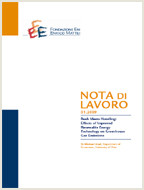Policies for a more Dematerialized EU Economy. Theoretical Underpinnings, Political Context and Expected Feasibility

01.05.2016
H23, O44, Q01, Q32
Dematerialization, Absolute Decoupling, Resource Efficiency, Policy Mixes, Qualitative Assessment
Climate Change: Economic Impacts and Adaptation
Francesco Bosello
Sustainability, 8(8), 717
Economic activities affect the environment through a multiplicity of channels. Besides generating GHG emissions that induce climatic changes, every modern economy is connected to the environment throughout a continuous flow of materials. To generate economic wealth, a modern economy demands natural resources, and produces a continuous flow of waste. The scarcity of natural resources and the negative externalities arising along the life cycle of the resources from the extraction of the resources to their transformation, the use of the final products and eventually the final disposal of the latter seem natural motivations for the current policy push towards a more dematerialized and a more circular economy. The EU in particular appears to be approaching a new frontier of the environmental policy. The main contribution of this paper is a qualitative assessment of this strategy. To this aim, we first investigate the theoretical and political rationale for the EU to foster dematerialization, and on this basis, we provide an economic assessment of the effective feasibility of the initiative. From a theoretical economics point of view, the paper provides an overview of the main externalities arising from materials’ extraction, use and disposal. In a policy perspective, the paper reviews the state of affairs of the major world countries (USA, Japan and China in particular) on this issue, and contextualizes the EU action in a global perspective. This paper investigates whether in this policy field the EU can globally play a decisive role by itself or its role may be limited to providing a good example for other countries to follow, as in the case of the reduction of GHG emissions. In the second part of the paper we discuss some of the most promising policies put forward by the DYNAMIX project. On the basis of the qualitative policy assessment performed in DYNAMIX, we illustrate why these measures might be worth serious consideration. A discussion regarding the political economy of the policies under scrutiny complements the analysis of their effectiveness and efficiency.
***
Suggested citation: Bigano, A., A. Sniegocki, J. Zotti, (2016), ‘Policies for a more Dematerialized EU Economy. Theoretical Underpinnings, Political Context and Expected Feasibility’, Sustainability 2016, 8(8), 717; doi:10.3390/su8080717
